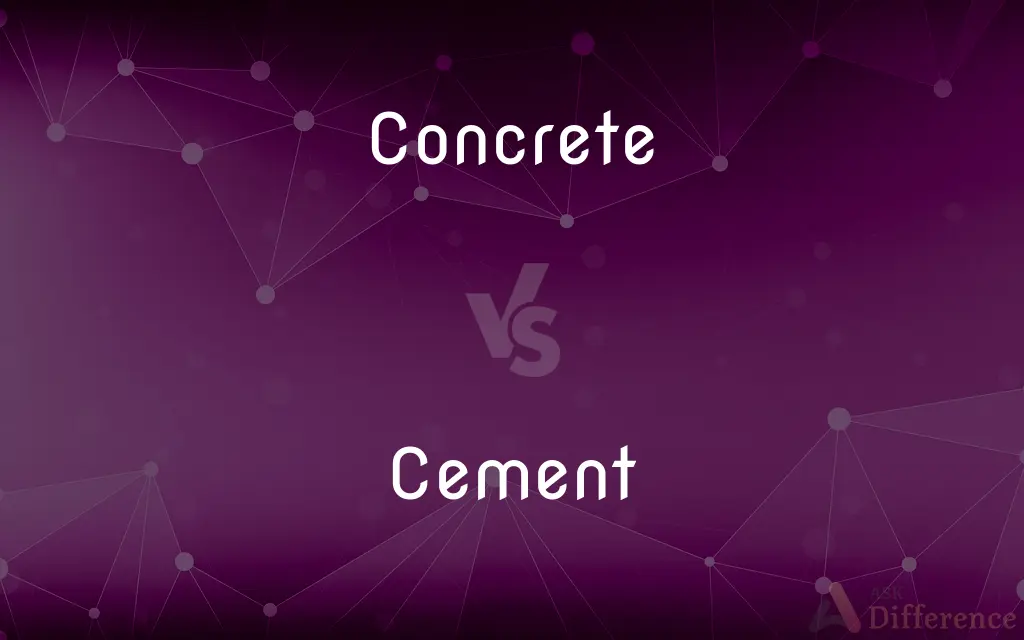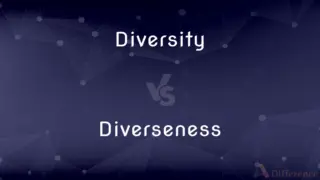Concrete vs. Cement — What's the Difference?
By Maham Liaqat & Urooj Arif — Updated on March 11, 2024
Concrete is a building material composed of cement, aggregate, and water, known for its strength and durability, while cement, typically Portland cement, is a powdery substance used as a binder in concrete.

Difference Between Concrete and Cement
Table of Contents
ADVERTISEMENT
Key Differences
Concrete is a composite material used in construction, known for its robustness and versatility in forming structures like buildings, bridges, and roads. It is made by mixing cement, an aggregate (such as gravel and sand), and water. The cement acts as a binder that holds the aggregate together once it hardens. On the other hand, cement, particularly Portland cement, is a key ingredient in concrete but is not used alone for construction purposes. It is a fine powder made from limestone and other minerals, which reacts with water to form a paste that binds the other components of concrete together.
When discussing strength and durability, concrete is valued for its high compressive strength and longevity, making it suitable for major construction projects. The specific properties of concrete can be adjusted by changing the ratios of its components, allowing for a wide range of uses from simple sidewalks to complex architectural structures. Cement, while critical to the structural integrity of concrete, does not possess significant strength on its own. Its primary role is to react chemically with water and bind the aggregate materials together within the concrete.
The curing process is another point of distinction. Concrete undergoes a curing process after it is poured, where it gradually hardens and gains strength over time through a chemical reaction known as hydration. This process is crucial for the development of the material's final properties. Cement, in the context of its role within concrete, also participates in this hydration process, but as a standalone material, it requires proper storage to prevent premature hydration and hardening before use.
In terms of environmental impact, the production of cement is a significant source of carbon dioxide emissions, contributing to environmental concerns related to climate change. The concrete industry, aware of these impacts, has been exploring more sustainable practices, including the use of alternative materials and recycling. Cement's environmental footprint is a key consideration in the broader context of concrete's sustainability, prompting ongoing research and development to find lower-carbon alternatives.
Finally, the versatility of concrete as a construction material contrasts with the more limited use of cement. Concrete can be cast into various shapes and sizes, finished with different textures, and even designed with special properties for specific applications, such as high tensile strength or resistance to environmental conditions. Cement's role is indispensable in creating concrete, but it is not a standalone material for construction, highlighting the interdependent relationship between these two essential components of modern construction.
ADVERTISEMENT
Comparison Chart
Composition
Mixture of cement, water, and aggregate (sand, gravel)
Powder made from limestone and other materials, reacts with water
Primary Use
Building material for structures like roads, bridges, buildings
Binder in concrete, not typically used alone for construction
Strength
High compressive strength, durable, versatile in applications
Acts as a binder, no significant strength on its own
Curing Process
Undergoes curing, gains strength over time through hydration
Part of the hydration reaction in concrete, requires moisture control when stored
Environmental Impact
Production involves significant energy, exploring sustainable options
High carbon dioxide emissions during production
Versatility
Can be cast in various shapes, with diverse finishes and properties
Limited to a binding role within concrete mixtures
Compare with Definitions
Concrete
A composite material used widely in construction for its strength.
Concrete was chosen for the foundation due to its durability.
Cement
A fine powder used as a binder in making concrete.
Cement must be mixed with water and aggregate to form concrete.
Concrete
Known for its high compressive strength and versatility.
The new bridge utilized high-strength concrete to ensure longevity.
Cement
Undergoes a chemical reaction with water (hydration) in concrete.
When water is added, the cement begins to harden, binding the aggregate.
Concrete
Consists of cement, aggregate, and water, mixed in various ratios.
The concrete mix was prepared with a specific ratio for the sidewalk.
Cement
Requires careful storage to prevent unwanted moisture exposure.
The bags of cement were stored in a dry area to prevent hardening.
Concrete
Cures over time, gaining strength through the hydration process.
The concrete structure will reach its full strength in about 28 days.
Cement
Associated with significant CO2 emissions during manufacturing.
The cement industry is exploring ways to reduce its carbon footprint.
Concrete
Being researched for more sustainable and eco-friendly alternatives.
The construction project used recycled materials in the concrete to reduce environmental impact.
Cement
Made from calcined limestone and other materials.
The production of cement involves heating limestone in a kiln.
Concrete
Concrete is a composite material composed of fine and coarse aggregate bonded together with a fluid cement (cement paste) that hardens (cures) over time. In the past, lime based cement binders, such as lime putty, were often used but sometimes with other hydraulic cements, such as a calcium aluminate cement or with Portland cement to form Portland cement concrete (named for its visual resemblance to Portland stone).
Cement
A cement is a binder, a substance used for construction that sets, hardens, and adheres to other materials to bind them together. Cement is seldom used on its own, but rather to bind sand and gravel (aggregate) together.
Concrete
Existing in a material or physical form; not abstract
Concrete objects like stones
Cement
A building material made by grinding calcined limestone and clay to a fine powder, which can be mixed with water and poured to set as a solid mass or used as an ingredient in making mortar or concrete.
Concrete
A building material made from a mixture of broken stone or gravel, sand, cement, and water, which can be spread or poured into moulds and forms a mass resembling stone on hardening
Slabs of concrete
Concrete blocks
Cement
Portland cement.
Concrete
Cover (an area) with concrete
The precious English countryside may soon be concreted over
Cement
Concrete.
Concrete
Form (something) into a mass; solidify
The juices of the plants are concreted upon the surface
Cement
A substance that hardens to act as an adhesive; glue.
Concrete
Of or relating to an actual, specific thing or instance; particular
Had the concrete evidence needed to convict.
Cement
Something that serves to bind or unite
“Custom was in early days the cement of society” (Walter Bagehot).
Concrete
Relating to nouns, such as flower or rain, that denote a material or tangible object or phenomenon.
Cement
(Geology) A chemically precipitated substance that binds particles of clastic rocks.
Concrete
Existing in reality or in real experience; perceptible by the senses; real
Concrete objects such as trees.
Cement
(Dentistry) A substance used for filling cavities or anchoring crowns, inlays, or other restorations.
Concrete
Formed by the coalescence of separate particles or parts into one mass; solid.
Cement
Variant of cementum.
Concrete
Made of hard, strong, conglomerate construction material.
Cement
To join or cover with cement
The workers cemented bricks in the wall.
Concrete
A hard, strong construction material consisting of sand, conglomerate gravel, pebbles, broken stone, or slag in a mortar or cement matrix.
Cement
To make binding; establish or strengthen
Signing the contract cemented the partners' agreement.
Concrete
A mass formed by the coalescence of particles.
Cement
To become cemented.
Concrete
To build, treat, or cover with hard, strong conglomerate construction material.
Cement
A powdered substance produced by firing (calcining) calcium carbonate (limestone) and clay that develops strong cohesive properties when mixed with water. The main ingredient of concrete.
Concrete
To form into a mass by coalescence or cohesion of particles or parts.
Cement
(uncountable) The paste-like substance resulting from mixing such a powder with water, or the rock-like substance that forms when it dries.
Concrete
To harden; solidify.
Cement
(uncountable) Any material with strong adhesive and cohesive properties such as binding agents, glues, grout.
Concrete
Real, actual, tangible.
Fuzzy videotapes and distorted sound recordings are not concrete evidence that Bigfoot exists.
Once arrested, I realized that handcuffs are concrete, even if my concept of what is legal wasn’t.
Cement
(figurative) A bond of union; that which unites firmly, as persons in friendship or in society.
The cement of our love
Concrete
Being or applying to actual things, not abstract qualities or categories.
Cement
(anatomy) The layer of bone investing the root and neck of a tooth; cementum.
Concrete
Particular, specific, rather than general.
While everyone else offered thoughts and prayers, she made a concrete proposal to help.
Concrete ideas
Cement
(transitive) To affix with cement.
Concrete
United by coalescence of separate particles, or liquid, into one mass or solid.
Cement
(transitive) To overlay or coat with cement.
To cement a cellar floor
Concrete
Made of concrete, a building material.
The office building had concrete flower boxes out front.
Cement
To unite firmly or closely.
Concrete
(obsolete) A solid mass formed by the coalescence of separate particles; a compound substance, a concretion.
Cement
(figuratively) To make permanent.
Concrete
Specifically, a building material created by mixing cement, water, and aggregate such as gravel and sand.
The road was made of concrete that had been poured in large slabs.
Cement
Any substance used for making bodies adhere to each other, as mortar, glue, etc.
Concrete
(logic) A term designating both a quality and the subject in which it exists; a concrete term.
Cement
A kind of calcined limestone, or a calcined mixture of clay and lime, for making mortar which will harden under water.
Concrete
Sugar boiled down from cane juice to a solid mass.
Cement
Bond of union; that which unites firmly, as persons in friendship, or men in society.
Concrete
(US) A dessert of frozen custard with various toppings.
Cement
The layer of bone investing the root and neck of a tooth; - called also cementum.
Concrete
(chemistry) An extract of herbal materials that has a semi-solid consistency, especially when such materials are partly aromatic.
Cement
To unite or cause to adhere by means of a cement.
Concrete
To cover with or encase in concrete (building material).
I hate grass, so I concreted over my lawn.
Cement
To unite firmly or closely.
Concrete
To solidify: to change from being abstract to being concrete (actual, real).
Cement
To overlay or coat with cement; as, to cement a cellar bottom.
Concrete
To unite or coalesce into a mass or a solid body.
Cement
To become cemented or firmly united; to cohere.
Concrete
United in growth; hence, formed by coalition of separate particles into one mass; united in a solid form.
The first concrete state, or consistent surface, of the chaos must be of the same figure as the last liquid state.
Cement
Concrete pavement is sometimes referred to as cement;
They stood on the gray cement beside the pool
Concrete
Standing for an object as it exists in nature, invested with all its qualities, as distinguished from standing for an attribute of an object; - opposed to abstract.
Concrete is opposed to abstract. The names of individuals are concrete, those of classes abstract.
Concrete terms, while they express the quality, do also express, or imply, or refer to, some subject to which it belongs.
Cement
A building material that is a powder made of a mixture of calcined limestone and clay; used with water and sand or gravel to make concrete and mortar
Concrete
A compound or mass formed by concretion, spontaneous union, or coalescence of separate particles of matter in one body.
To divide all concretes, minerals and others, into the same number of distinct substances.
Cement
Something that hardens to act as adhesive material
Concrete
A mixture of gravel, pebbles, or broken stone with cement or with tar, etc., used for sidewalks, roadways, foundations, etc., and esp. for submarine structures.
Cement
Any of various materials used by dentists to fill cavities in teeth
Concrete
A term designating both a quality and the subject in which it exists; a concrete term.
The concretes "father" and "son" have, or might have, the abstracts "paternity" and "filiety".
Cement
A specialized bony substance covering the root of a tooth
Concrete
Sugar boiled down from cane juice to a solid mass.
Cement
Make fast as if with cement;
We cemented our friendship
Concrete
To unite or coalesce, as separate particles, into a mass or solid body.
Cement
Cover or coat with cement
Concrete
To form into a mass, as by the cohesion or coalescence of separate particles.
There are in our inferior world divers bodies that are concreted out of others.
Cement
Bind or join with or as if with cement
Concrete
To cover with, or form of, concrete, as a pavement.
Concrete
A strong hard building material composed of sand and gravel and cement and water
Concrete
Cover with cement;
Concrete the walls
Concrete
Form into a solid mass; coalesce
Concrete
Capable of being perceived by the senses; not abstract or imaginary;
Concrete objects such as trees
Concrete
Formed by the coalescence of particles
Common Curiosities
Is concrete flexible in its application?
Yes, concrete can be molded into various shapes when wet and has a wide range of applications in construction.
What is concrete made of?
Concrete is made of cement, water, aggregates (like sand and gravel), and sometimes admixtures.
Can concrete be used without cement?
No, cement is essential for concrete as it acts as the binder that gives concrete its strength.
How is cement used in construction?
Cement is used as a binder in concrete and mortar, holding other materials together in the mixture.
Can cement harden without water?
No, cement needs to undergo a hydration reaction with water to harden and gain strength.
Are there alternatives to using cement in concrete?
While cement is central to traditional concrete, some alternatives and supplements like fly ash or slag cement can partially replace cement in concrete.
What makes concrete so durable?
Concrete's durability comes from the chemical reaction between cement and water, which forms a hard, stone-like material capable of withstanding significant loads.
Can concrete include recycled materials?
Yes, concrete can incorporate recycled materials as part of its aggregates, reducing its environmental impact.
What is the environmental impact of cement?
Cement production is energy-intensive and releases significant amounts of CO2, contributing to environmental concerns.
Why is concrete preferred in large construction projects?
Concrete is preferred for its strength, durability, and versatility, making it suitable for a wide range of construction applications.
What distinguishes cement from concrete in terms of composition?
Cement is a powdery material made from limestone and clay, while concrete is a composite that includes cement, water, and aggregates.
How does the production of cement and concrete differ?
Cement production involves heating limestone and clay in a kiln, while concrete production involves mixing cement with water and aggregates.
How does the curing process affect concrete?
The curing process allows concrete to reach its maximum strength through proper hydration, essential for its durability and performance.
What role does water play in cement and concrete?
Water is crucial for the hydration reaction in cement, which binds the mixture together and gives concrete its strength.
How do variations in concrete mixtures affect its properties?
Variations in the proportions and types of ingredients can tailor concrete's properties, such as strength, workability, and resistance, to specific project requirements.
Share Your Discovery

Previous Comparison
Summary vs. Precis
Next Comparison
Diversity vs. DiversenessAuthor Spotlight
Written by
Maham LiaqatCo-written by
Urooj ArifUrooj is a skilled content writer at Ask Difference, known for her exceptional ability to simplify complex topics into engaging and informative content. With a passion for research and a flair for clear, concise writing, she consistently delivers articles that resonate with our diverse audience.















































